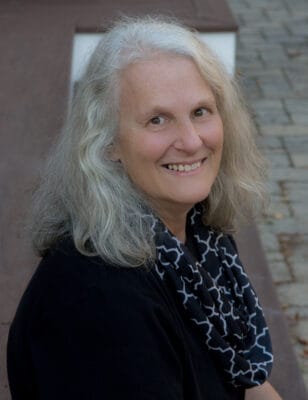A Different Life Worth Living
A peer specialist gave Barbara hope after nearly two decades in and out of hospitals, on dozens of meds, and out of work. Now, she herself is a peer specialist, works full-time, and is a fierce advocate for mental health and social justice.

Story
I have resisted writing my “Better Because” story as, in many ways, I do not feel that my life is better. Treatment for me was traumatic and I was forced to give up my passion, career, and much more—not because of illness, but because of treatment. However, there are some things I have today that truly are “better because” of what I’ve been through. I did not get my life back, but I have created a different life worth living.
When I was a teen, I was sexually abused several times by two men I trusted and knew well. At that time, I was laser-focused on what I wanted, which was to become a veterinarian. I was able to totally block the abuse from my mind and did not allow what happened to throw me off course. I went on to graduate from college and veterinary school. This demonstrated both my resilience and resourcefulness in achieving my goal, but it was not without pain and sacrifice. One thing I lost in this journey was the ability to develop trust in anyone or maintain deep personal relationships.
For the next several years, my life moved forward without disruption. I became an officer in the US Air Force Veterinary Corps, I got married, and I had two beautiful children.
Then the unexpected and unprecedented entered my life again.
Then the unexpected and unprecedented entered my life again. I received a head injury from a fall, resulting in a decline in my ability to do my work. I lost “executive functions” such as memory, attention, and problem-solving skills. I was the expert in my job, and no one else noticed any problems with my work at first, but I knew I wasn’t functioning at the level I had previously.
Shortly after the head injury, I was pregnant with my third child and developed hyperthyroidism. I was also having difficulty eating and keeping any food down, and I was often dehydrated and needed IV fluids. I eventually had to have a central line put in so I could give myself IV nutrition every night. My doctors attributed this to my pregnancy, but I knew it was more than that and felt it had become a behavior I could not control. I felt a great deal of shame and guilt about what I might have been doing to my unborn child. (Thankfully, he was not harmed.)

Gradually, this affected my ability to care for my children and myself, resulting in my first visit to a psychiatrist and a subsequent hospitalization. A few weeks later, I received the prognosis from my psychiatrist—I would never work again, live on my own, or raise my children. My husband left us when he heard this. Any resilience and resourcefulness I’d had in the past were gone. I was overwhelmed and afraid. For the first time in my life, I gave up.
I lived for over 14 years resigned to life as a psych patient, on multiple mind-numbing drugs, and dependent on mental health professionals to get from one day to the next. From 1994 to 2008, I was hospitalized over 70 times, was on at least 37 psych drugs, and was not employed.
But in 2008, my life improved when I met a peer specialist. Talking with them helped me get back in touch with what my life could be. For the first time, I had hope that I might again find purpose and the will to live.
My journey has not all been smooth sailing, but I have not had a psychiatric admission since I was introduced to peer support. I began facilitating groups, and in 2012, I became a certified peer specialist. I went back to work full-time in 2014 after 20 years on Social Security Disability Insurance. Four years ago, I successfully weaned off all my psych drugs. I am not anti-medication or pill-shaming—this was a choice for me, and I did it through informed consent and supported decision-making.
What has made the most difference for me is that my experience has increased my empathy for others, resulting in some very strong personal connections that are truly mutual—people I can offer support to and who also support me.
What has made the most difference for me is that my experience has increased my empathy for others, resulting in some very strong personal connections that are truly mutual—people I can offer support to and who also support me. This is epitomized in the Alternatives to Suicide group I co-facilitate.
I also cherish my dog, Archer. He is my partner in this journey. I have learned mindfulness from him. On walks in the woods, I watch him and think, “I want to be like Archer. What does he see, smell, hear?” Watching him, I have learned how to be truly present and appreciate the moment.

I have become a fierce advocate for change to the mental health system. My anger about my experience often motivates me to speak out so that no one else is treated as I was. My advocacy has grown from a primary focus on the mental health system to a broader focus on social justice and all the “-isms” inherent in most systems.
I’ve provided peer support on an in-patient unit for a peer-run organization and as a Veteran-to-Veteran volunteer at the VA. I directed certification training for peer specialists in Massachusetts, and I served as the Interim Director of Operations for a national organization. To steal a phrase from the Peace Corps, this is the toughest job you’ll ever love.
Finally, my relationship with my children has become very strong. We went through some trying times when they were young, but they always believed in me and I in them.
All of this has given me purpose again and helped me create a life worth living.
About the contributor
Martha Barbone enjoys spending time with her three adult children and her dogs, Archer, King, and Judge. She has worked providing peer support and training in clinical and peer-run organizations and uses her voice to advocate for systems change.